The German Shepherd is rated as one of the most intelligent of all dog breeds and continues to be very popular around the world. The German Shepherd has a loyal fan base and continues to trend well amongst dog lovers, despite many other popular breeds emerging over the last 20 years.
German Shepherd Training
The breed ranks high in popularity all around the world including the United Kingdom, USA, Australia, New Zealand, and Canada. They are great family dogs but will usually still attach themselves to one member of the family. This usually will be a person that they respect and see as someone they perceive to be a strong individual with leadership qualities and traits, the kind of bond that effective German Shepherd Training helps to develop and maintain.
Bark Busters rates this breed as 2nd to the Labrador for the most trained breed we see, coming in second to the Labrador in United States, Canada, Australia, New Zealand and coming a close third to the Staffordshire Bull Terrier and Labrador in the United Kingdom.
We believe their popularity is due to their undying loyalty and naturally protective nature, which stems from their heritage as guarders of sheep. They originated as a wolf-like breed that was capable of herding and controlling sheep and a formidable force capable of fending off wolves in the countryside and hills of native Germany. This natural intelligence and working drive make German Shepherd Training both highly rewarding and essential to ensuring a balanced temperament.
They are very trainable, but some are not the easiest dog to train, due to their determined, strong-willed nature. They won’t comply for just anyone and will need strong leadership. Once trained correctly, they generally stay trained with only small amounts of regular maintenance and consistent rules, a hallmark of successful German Shepherd Training programs.
The German Shepherd needs expert training, that uses a method that is breed specific, something aimed towards understanding their personality that is kind and humane.
Dog owners nowadays understand the importance of locating kind and humane training for their pets that is dog-friendly and fits into their busy time-scale and training needs. With professional German Shepherd Training, owners can bring out the best in this intelligent, loyal, and protective breed while building a relationship based on trust and respect.
Personality and Temperament
German Shepherds are slow to mature. In some cases, reaching full maturity can take up to 4 years before you see the personality of a mature dog kick in. Meanwhile, you might have to contend with a puppy’s brain, housed in a full grown powerful dog. The wait is worth it!
It is for that reason, we recommend that you practice some good management of your German Shepherd puppy from an early age on to reduce any property damage, while they mature and develop.
Don’t leave your puppy confined for long hours. Not only will they not like it, but they need to have their intellect challenged on a daily basis, so make sure you provide the right kind of entertainment for them. Ideally, they need to be mentally stimulated and busy or they will find something to occupy their brain that could result in the damage of your precious possessions.
Some are over friendly, and others are at the other end of the scale, making them wary of strangers or aggressive. This can be dependent on its breeding and the dog’s bloodlines, as well as its upbringing, the type of environment it is raised in, and the education it receives as it grows and develops.
Dogs Have Four Basic Needs
Food -
Select the right diet for your dog. One that possesses all your dog’s nutritional needs. Remember that a slow-maturing breed will need the right nutrition, so do your research on the best diet for this breed.
Shelter -
They need a place to call their own, a bed of its own, or a place where it can feel safe such as a den-like crate.
Safety -
Your dog’s feeling of security comes directly from your leadership. You must quickly let them know you are in control and leading, or chaos may occur.
Entertainment -
Your German Shepherd dog needs to be entertained to reduce boredom and to stave off Separation Anxiety. Toys and activities are vital to ensure that your dog is less destructive too.
Behaviour Problems
German Shepherds have their fair share of behaviour problems, such as barking, aggression towards strangers and over-protectiveness of the home and family, which can stem from their natural suspicion of strangers.
Aggression
Aggression in German Shepherd ranks as one of the highest behaviour problem we see out of all the dog breeds. A staggering 40% of German Shepherd owners that we see report aggression to people or other animals. Many people have German Shepherds to protect their home and to keep their family safe. They may encourage barking or aggression when there is a noise outside, or a knock at the door, to ward off any would-be burglar. However, it’s important to remember that your dog is indiscriminate and may well show the same behaviour to people outside the home who are innocently walking by or jogging in the park, and innocent visitors to your home too.
Pulling on the Lead
Pulling on the lead also ranks quite high in their list of behaviour problems as they have this innate need to always walk ahead of their owners.
Getting your German Shepherd to walk correctly on the lead, by your side, needs expertise and the right walking technique or you could struggle to control such a powerful dog.
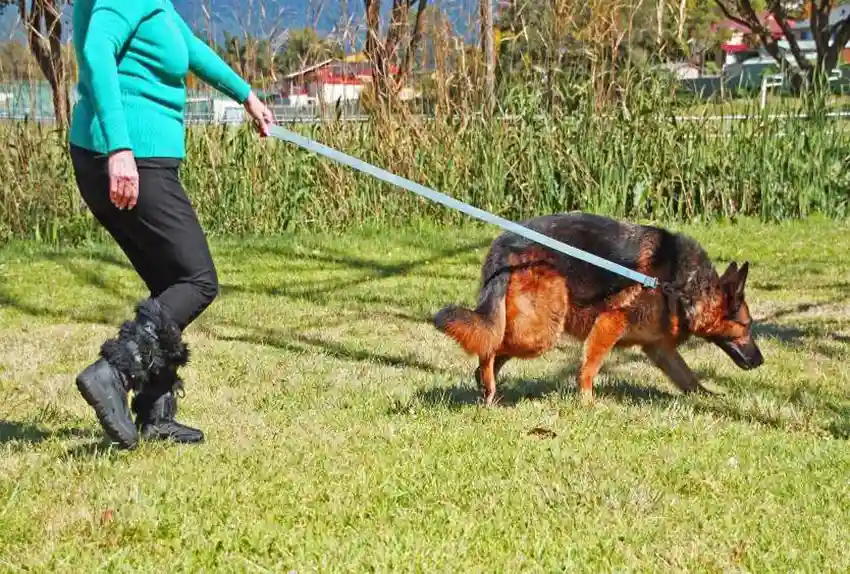
Chewing or over-exuberance
Chewing or over-exuberance are usually more prevalent in German Shepherd puppies. Like all breeds, they need entertainment to satisfy their intelligence levels, as well as exercise and education. Don’t take on a German Shepherd dog or puppy unless you have the time to devote to them and the energy levels that they deserve.
German Shepherds will generally attach themselves to one person in the family, but they can still be a good family dog.
Although they have their fair share of behaviour problems, these generally stem from a lack of leadership on the part of their pet parents. They are very trainable, but they do have strong personalities that need the right type of parenting and the right type of training that is just and fair. Then you will see how wonderful they can be.
They are definitely worth the effort if you can stay the course and they will repay you tenfold. If you can invest the time in education and training, you will reap the benefits in the long run.
Sibling Rivalry
If you already have a dog and want to add another, there are some things to consider before doing so.
If possible, match the size of the dogs and look to add the opposite sex. Female dogs traditionally ‘rule the roost’ and adding a neutered male will cause few issues. Adding a neutered male to the family when you already have a similarly sized neutered male will normally go off without a hitch, providing you treat them equally.
However, matching two females is a bit harder and we do encounter many situations where we are asked to treat what is commonly referred to as “Sibling Rivalry’’ even if they are not true siblings.
If you encounter such a situation, separate the dogs, and seek expert help. Bark Busters is always here to help.
Socialisation
The best type of safe socialisation for your German Shepherd puppy, is with dog owners you know that have a friendly dog, that is sensible and not intimidating towards puppies. Some dogs are too bossy with puppies, and this can instil fear in a very young and inexperienced puppy.
The wrong kind of socialisation is with a dog that is intimidating which is possibly going to frighten an inexperienced puppy and possibly cause it long-term behaviour problems. This could lead to aggression towards other dogs as your puppy matures. Be selective of which dog you choose to play and socialise with your puppy.
Dog Parks
If you are determined to take your dog to a doggy park or a place designed to meet other adult dogs, we recommend that you wait until they have reached 12 months of age. The concern about dog parks is the natural intimidation that older dogs project when they encounter puppies. This can give your puppy lasting bad impressions, which can later lead to aggression towards other dogs, as your puppy reaches maturity.
Even other puppies can bully and intimidate your dog, so don’t rush off to a dog park, let your puppy enjoy pleasant experiences with well-behaved dogs or puppies first.
However, if fully immunised, you can sit with your puppy on your lap in a public area or park, where it can watch the world from a safe place. This way it won’t be intimidated or frightened by over-exuberant mature dogs or other larger puppies.
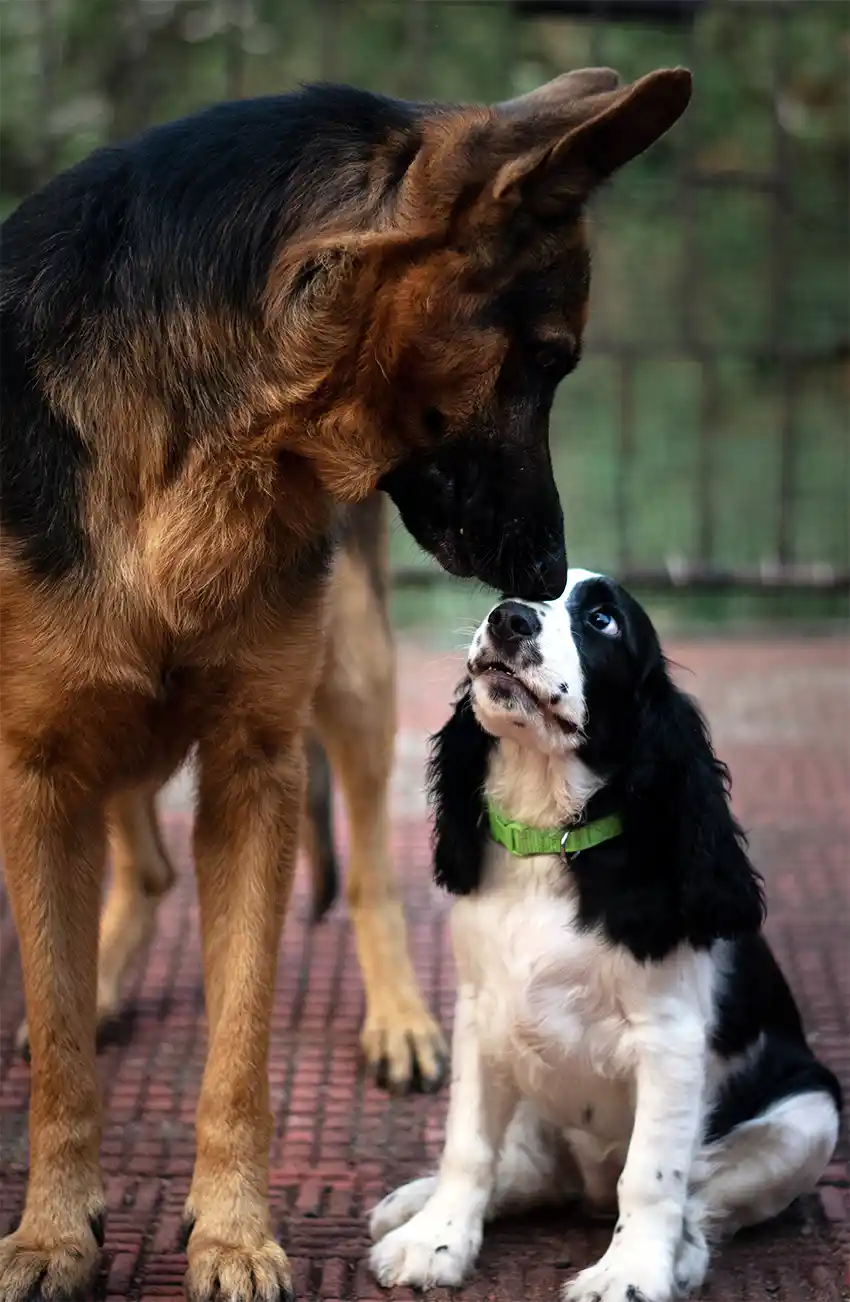
Breed Capabilities
It is the German Shepherd's inherited attributes that has seen them to be one of the most selected dogs for police work, assistance, therapy, support dogs and scent detection dogs. They are skilled at all types of detection work, including drug and bomb detection.
They will master any task you set out for them, but you will need patience and determination to get the best out of them.
The German Shepherd does extremely well at obedience training and agility work. They love to be kept busy and to have an outlet for their energy and intellect.
Search and Rescue
They have great scenting attributes and are ideal for Search and Rescue work. You can start your German Shepherd puppy off with simple scenting tasks.
Start by hiding food and getting your dog to find it. Then hide their favourite toy and encourage your dog to follow the scent trail.
Repeat a command, over and over, using a command like "seek, seek, seek".
Eventually, that word will see your dog place its nose to the ground and bound off in the direction of where you hid the toy.
Add a degree of difficulty incrementally, growing on your dog's ability to find lost items until you are ready for more advanced work.

Diet
Speak to your vet about the best diet for your dog or research online as to what might be the best diet for your German Shepherd puppy.
The German Shepherd needs good quality food and nutrition, or they will suffer from a form of growing malnutrition, where the food being fed is not sufficient to feed a growing and developing dog.
Energy Levels
The German Shepherd has very high energy levels and can be the type of breed that will charge through the house, jumping on everything and everyone, sweeping objects off the table with their tail as they go.
Their strength is something that their owners sometimes complain about and find hard to control. Strong leadership is needed and the correct communication is a must so they are kept under control.
Address some of these energy levels by exercising your dog’s mind and body. Hiding treats around the garden or home can help and providing the right toys and obedience training that stimulate their active mind.
Child's Play
Due to their size and energy levels, you must give thought to how your dog and children will interact. Any play between your dog and children must be monitored and always controlled. Children have a way of getting dogs excited and this can lead to the dog inadvertently hurting the child through their natural excitable, boisterous behaviour.
Make sure that you educate the children to play sensibly and instruct them to play games that are less likely to lead to over-exuberance, such as hide and seek games or fetch games, not the rough and tumble type of games or wrestling.
Wrestling games can cause your dog to become over-excited and to mouth and play-bite every time it sees the children. In turn, your children will try to avoid your dog, because they fear getting hurt.
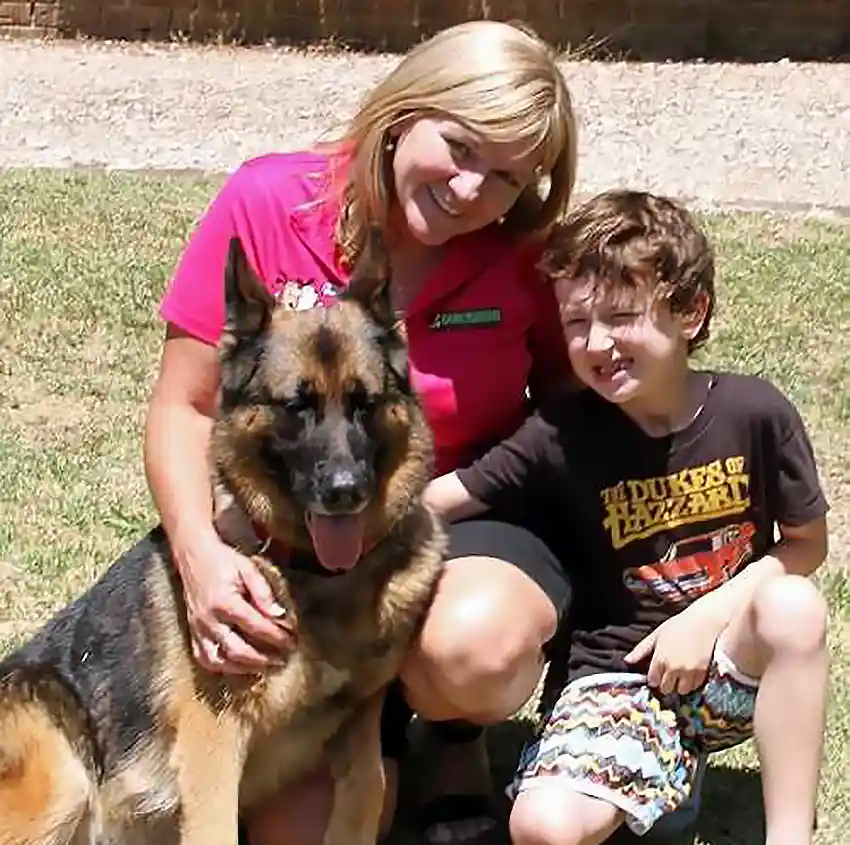
Adult Play
Any form of play, 'fetch the ball' and especially tug-of-war games, must end with you taking control of the item. Once the game is over, take the item out of play, with a 'Finish' command and lots of praise.
This technique is designed to show the dog in a subtle way, that you are the decision maker and that you control the game.
Encourage your German Shepherd to use its brain by hiding items that can be found or playing a controlled game of fetch, where you teach how to wait until told to go get the ball.
Puppy Selection
If selecting a puppy from a breeder, insist on viewing both parents to determine the type of personality your puppy might grow up to have.
Puppies inherit a lot from their parents, including their personality and genetics. If you spot a parent that has signs of serious aggression or fear issues, this dog is not likely to produce the offspring that will grow into the ideal pet.
Puppies also learn a lot from their parents while they are with them. Their mother guides their behaviour. If she is tolerant and outgoing, then the puppies will usually be the same. If they get a lot of human contact, then they will be accustomed to humans and generally feel good about them.
All this early education is important and therefore it is not wise to take possession of your puppy until at least 8 weeks of age but 12 weeks is much better. Experienced breeders will want to adhere to this as they know that the puppy gains a lot of education if it is allowed to stay in that environment a little longer.
Don’t trust anyone who says that you can take a puppy away at the age of 4 to 5 weeks. That is bad advice!
Should We Adopt One Puppy or Two
Prospective puppy parents often ask us, whether they should adopt one or two puppies and our answer is always the same. Only adopt two if you actually want two dogs.
Getting two puppies because one might be lonely is not a good idea. A puppy is adaptable if given the right environment and education in which to thrive. They soon look upon you as a two-legged dog and they can fit right into your social structure.
Some may find this hard to fathom, that a dog might look at them as they would another dog, yet the same people will think of their dog as a little four-legged human.
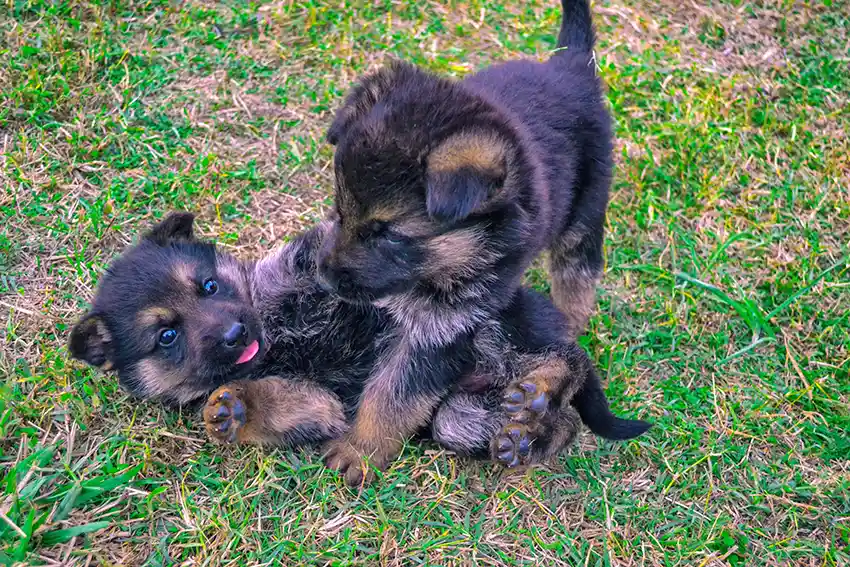
Considerations When Selecting
Always check out how the dog walks, look at its hind legs and see if you can spot any weakness there. Is the puppy or dog friendly with you or are you being told they will be okay when they get to know you? That is a warning sign that the dog or puppy has issues with strangers, and once there is a property or family protect, it could cause you some problems. It is best to select a dog that loves everybody because they are the most stable and will be the dog that you can trust to be a great companion.
A dog, regardless of how friendly, will more than likely still bark when they hear strangers approaching their home.
Check out the animal shelters/rescues or speak to breeders, to find the right dog for your needs.
Bringing a New Puppy Home
Always try to bring your new dog or puppy home early in the day. The reason behind this is to give much daylight time as possible to become accustomed to their new home. If you can bring something from there old home, some bedding or a toy, this will help them to get settled.
Ensure that you have pre-selected where your new dog or puppy will sleep and start to get them use to this by feeding them there during the day and spending time with them there. If the dog is crate trained, place them in their crate well before bedtime. If they are not crate trained, you will need to accustom your dog to the crate first. See our crate training guide. If it is a puppy and you would like to start off with a crate, place them in there and monitor how they react when left.
Select a place that is practical, and it should not be your bed unless you are determined to always have your dog sleep with you. It might not be a habit you can break easily in the future.
If your dog or puppy begins barking or crying, don’t immediately rush back to them. That will only reinforce that if they cry you will come, and it will make the situation worse. Instead stay close by and address any concerns when they stop crying, reinforcing that if they are not crying you will come. Puppies are like newborn babies, and they would like to be constantly held versus being placed in their bed.
Remember, your dog or puppy did have a home before this one, and it will need time to learn that this is their new home. Those first couple of days away from their mother can be scary!
Games to Play
Identify the games that will enhance your dog’s wanted behaviour, versus games that will increase its unwanted behaviour.
We recommend that you don’t play hand games or chasing games that encourage a dog to bite or chase, or where you chase your dog or puppy around the house or garden. These games encourage biting and running away, causing recall issues. You will be teaching your dog bad habits, not good ones.
Always be mindful of what you teach your dog and make sure it is something productive. You hold the key to how your German Shepherd will grow and develop, so make wise choices.
Puzzle and Treat Dispensing Toys
When providing entertainment for your dog, we recommend educational toys. These are the ones that you can fill with treats and where your dog works out how to get the treats out. These are highly recommended to stave off destructive behaviours and to provide an outlet for your German Shepherd’s intellect.
To stave off destructive behaviours and keep your dog physically and mentally challenged, buy toys that slowly dispense treats to keep them occupied, prevent boredom, and help with separation anxiety. These toys can help your dog to direct their energy in a positive way.
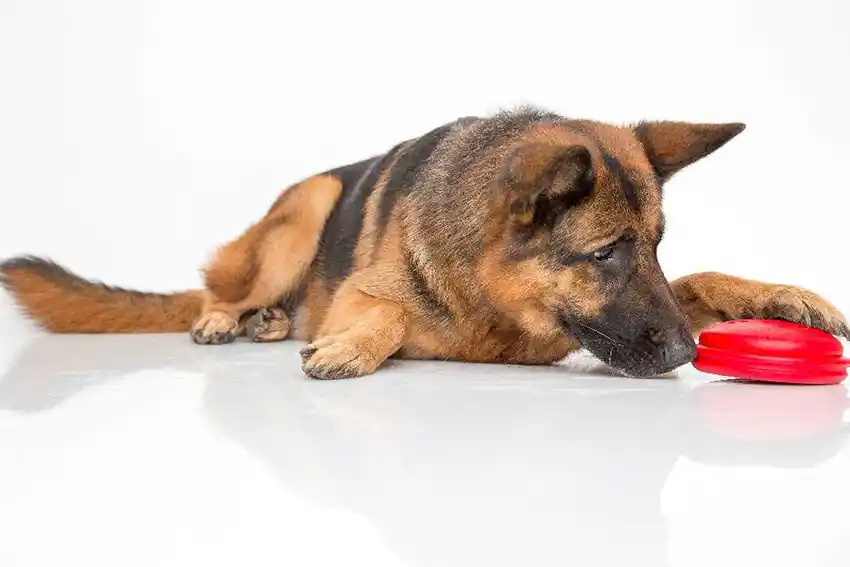
Check out toys like the GameChanger® by Bark Busters, which is a treat and chew toy all in one. The toy is quiet and won’t damage your hardwood floors or furniture, unlike hard plastic toys. This toy is flexible and is BPA-free. It won’t break teeth and won’t hurt your dog’s mouth. Kongs and Buster Cubes are also good to keep your dog entertained too.
Genetics
If possible, check bloodlines or have a vet do an appropriate examination before you select a puppy or adopt your German Shepherd.
A dog with identified genetic faults should ever be used for breeding, or you will just pass on genetic faults to their offspring.
Most modern-day shelters spay / neuter their dogs and conduct vet checks for medical soundness before placing them up for adoption. Visit your local shelter or rescue to see what great dogs they have available.
Choose reputable registered breeders as they usually "score" their dogs, which means they have them X-rayed for common genetic faults and will be able to provide a score. If buying a puppy from a breeder, ask for the score results. Shelters and rescues won’t have these luxuries, but they are generally experienced at spotting obvious problems which is based on an informed opinion and experience.
Toilet Training
There are definite times when your puppy will need to toilet. Here we identify six critical times.
- Immediately after eating or drinking
- When they first wake up in the morning
- After exuberant play
- When woken during the night, such as the phone rings or you get up to use the bathroom.
- When you arrive home and your dog greets you
- If they get frightened or scared by something or someone
Take your puppy to a designated toilet area. Grass or dirt is best as we don’t want them associating their toilet with anything related to carpet or floors in general.
Toilet Training Aids
If you need to leave your puppy or dog for any length of time, it might be wise to provide an indoor toilet that you can eventually transition to the outdoors. Artificial grass products can be good and one that we would recommend if you can setup an indoor toileting area.
Bark Busters Lifetime Support Guarantee
Bark Busters dog behaviour therapists and trainers have trained more than 1 Million dogs worldwide and are renowned authorities in addressing dog behaviour with all-natural, dog-friendly methods. The Bark Busters training is the only service of its kind to provide International dog training guaranteed lifetime support. With hundreds of trainers around the world, Bark Busters continues its mission to enhance the human/canine relationship and to reduce the possibility of maltreatment, abandonment and euthanasia. Contact your local Bark Busters dog trainer to see how they can help.
This article is the copyright of Bark Busters® and is intended for information purposes only. Dog owners should fully research any problems that they may have with their dogs.
